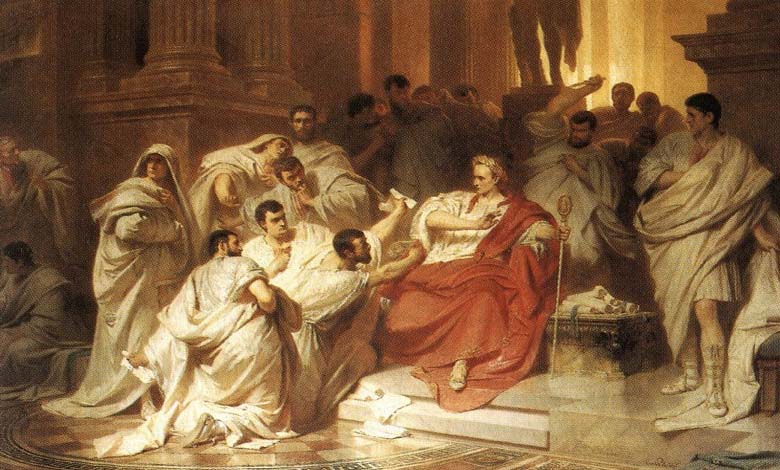“Even You, Brutus?” : The Story of an Emperor Killed by a Friend’s Betrayal

“Even you, Brutus?” is a phrase often used to describe the betrayal of friends, but did you know it was uttered by a betrayed person at the moment of his last breath, stabbed by his dearest friend?
The betrayal of friends can be common and somewhat unnoticed, but when the victim is Julius Caesar, one of the political and military geniuses and a famous figure of ancient Rome, the story takes on another dimension.
He is mentioned in history as an exceptional figure. He was a successful military leader, a shrewd politician, and a brilliant orator who captivated crowds with his speeches and persuaded even his fiercest enemies.
However, the emperor, who succeeded during his reign in reducing the powers of the aristocrats and suppressing rebellions that had lasted for nearly a century, was accumulating enemies without realizing it. Many nobles did not appreciate the curtailment of their powers.
The Story
Historians say that one of Julius Caesar’s weaknesses was that he was kind-hearted. Even the countries he conquered did not describe him as barbaric, unlike other conquerors, probably due to his love for writing. He was passionate about language and a skilled manipulator of words, offering Rome many writings.
But behind the scenes of power, there were calculations, alignments, and betrayals that he was unaware of. He also did not understand the consequences of the frustration and resentment among the nobles after being stripped of many powers.
After resounding victories and great achievements during his years of wandering as a conqueror, Julius Caesar returned home. The nobles did not welcome this return with joy, knowing that his presence would cut their influence.
However, they showed him friendship by welcoming him, drowning him in words of praise and acclaim for his achievements. He did not suspect that those smiling lips were the same ones preparing the poison to assassinate him.
Behind closed doors and in dark rooms, these nobles agreed to assassinate Julius Caesar, but the problem was that none of them wanted to be individually involved in spilling his blood.
Each of them knew for sure that if they carried out the task, they would not survive, as the other nobles themselves would offer them as a scapegoat before the people.
Amid their confusion, one of the nobles, Gaius Cassius Longinus, proposed a plan for a collective assassination where each of them would stab Julius Caesar, so no individual would be blamed for what happened.
Cassius did not just rely on these noble members of the Roman Senate but also sought to convince Julius Caesar’s opponents and all those who feared for their wealth and powers that he was a traitor, an accusation sufficient to give the green light for his assassination.
Indeed, Cassius succeeded in convincing the Senate members of his idea, and they all agreed on the details of the operation and its timing, setting the date for his arrival at a Senate meeting.
“Even You, Brutus?”
In this plan, Cassius did not overlook an important element: Brutus, Julius Caesar’s close friend and confidant. This task was the most difficult of the entire plan.
However, Cassius eventually succeeded in convincing Brutus that Caesar was a traitor and needed to be killed to save Rome. With this, the fate of the emperor was sealed.
On a grim morning in 44 BC, Julius Caesar entered the Senate. Cassius greeted him with the first stab in the neck, followed by many more in a frenzy that flooded hands and the place with blood.
Julius Caesar’s eyes followed in astonishment what was happening, even as he drowned in his blood. He examined the faces taking turns stabbing him and showed some automatic resistance by raising his hands to protect his face, then turning them to his entrails to fend off another dagger coming from elsewhere.
But when it was Brutus’ turn to deliver the final stab, Julius Caesar ceased all resistance. He covered his face and head with his garment, surrendering to the blows, and uttered his famous phrase: “Even you, Brutus?”
Brutus replied, justifying his stance: “I love you, but I love Rome more.” Caesar, breathing his last, said: “Then let Caesar die.”
He fell dead at the feet of Pompey’s statue. Historians say that while the stabs from his enemies killed him, it was his friend’s betrayal that wounded him deeply.












